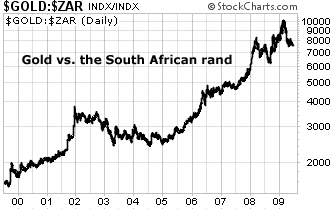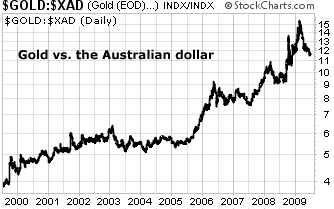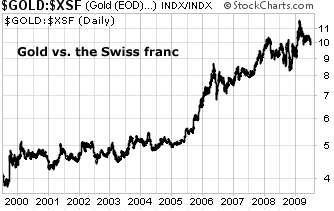Gold The Greatest Currency Trade of the Millennium
Commodities / Gold and Silver 2010 Dec 26, 2009 - 02:38 PM GMTBy: DailyWealth
 Chris Weber writes: Even though gold has been in a correction during these last few months, it is important to step back and see how it has out-performed every other currency since this decade, century, and millennium began.
Chris Weber writes: Even though gold has been in a correction during these last few months, it is important to step back and see how it has out-performed every other currency since this decade, century, and millennium began.
I first recommended gold and gold stocks back in February 2002 because the trend I saw of currencies cheapening themselves against their trading partners. You can call this "competitive devaluation." This had not been seen since the Great Depression, and to me, even back then, was a signal that the world economy was heading into tough times.
Since about 2001, whenever any currency rises too much, the local manufacturers or farmers – or anyone who lives by exporting – start to scream about it. Their local governments respond by doing all they can to lower the value of that currency, having it fall in value and thus making exports cheaper, all this in the hope that the domestic economy will become better.
Pick any period so far this young century and you'll see how this is true. For instance, right now you see it in those countries whose currencies have soared the most in the last few months. Let's focus on a recent highflying currency...
The New Zealand dollar has soared 23.6% against the U.S. dollar from mid-March through mid-June. That's the best three-month performance for the Kiwi dollar since way back in 1971, when currencies began floating against each other. New Zealand depends on exports, especially agricultural exports. Total export prices have plunged 8.2% from last quarter 2008 to first quarter 2009. This is not an annualized rate, either, but a quarter-to-quarter drop. If it continued at that rate, it would mean a 33% fall in export income over the year.
Now, the New Zealand monetary authorities are doing all they can do cheapen their dollar. That includes slashing interest rates to just 2.5%, which is a shock to those of us who remember Kiwi interest rates as being the highest in the world. They are printing money and talking about actively intervening in the currency markets to sell their dollar short. New Zealand's Finance Minister, Bill English, just came right out and said that his government would prefer a weaker currency.
The same thing is happening in Switzerland, Australia, Canada, and Norway, which have all seen their currencies strengthen recently.
At any given time in the last few years, whichever currencies have been strongest have screamed about it. A year ago, with the euro at $1.60, Germany – a huge exporting country – basically said it wanted a cheaper euro. It got it: The euro fell to $1.23 within months. The UK wanted its highflying pound, then $2.10, to fall to boost domestic and foreign demand for its goods. It got its wish: Within months, the pound had plunged to $1.45. And on it has gone for a few years now.
As all the countries with unwanted strong currencies move to cheapen them by printing more money, slashing interest rates, or just "talking" it down, the question remains, just what are those high currencies declining against?
If you answer, "against the currencies of their main trading partners," well, yes, this is true. But it is only temporary. If they are successful in this, then the trading partners don't want their own currencies to go too high, so at some point they try to cheapen them.
It has become an endless round-robin game, except to call it a "game" is a little perverse. All holders of currencies suffer in the decline of the purchasing power of their money. You go lower, but then your partners go even lower, and then you have to cheapen your money yet more... It's an endless cycle that really doesn't help the world economy in the long run.
But there has been one money that has benefited from this huge trend. Moreover, it has benefited by giving profits of hundreds of percent –minimum – to anyone on Earth who has owned it since 2000. It is the oldest money of all, a money that has been used long before any of the other currencies were even dreamed about and will be used long after all of them are memories in history books. It is a money that cannot be printed at will and artificially cheapened. And even though all central banks own it, it is the creature of none of them.
I'm speaking, in case you haven't guessed, about gold. Sure, you can play the currency market. I've done it for over 35 years now, and have done nicely. You can buy a currency that is way too cheap and wait, getting paid nice interest while you wait. (At least you could have done that until recently. Now no matter what currency you hold you get paid nearly zero.)
But shall we now see what gold has done in terms of the major currencies of the world?
The South African rand has been the strongest currency so far this year. It is a big gold producer. Yet look the price of an ounce of gold since 2000 in terms of the rand.


It has soared against the Canadian dollar (+178%), the Russian ruble (+360%), the Mexican peso (+417%), and even the Swiss franc (+155%), a currency that has long been regarded as the strongest on Earth.

You can talk about or trade the merits of one paper currency against the other, but they've all been falling against gold.
Put another way, every person on Earth over the past decade, regardless of where they live, would have made hundreds of percent in terms of their own currency had they just owned gold.
Most people do not hold mostly gold and silver in their portfolios. With this fact, I believe that both have much more to rise before their bull markets are finished. Well into the future we'll see the phenomena of the average person piling in, as happens towards the end of every bull market... We'll see the same action in gold; it's just a matter of time.
Good investing,
Chris
Editor's note: Chris Weber is one of the best investors we know, period. He started investing at age 16 and made so much money, he's never had a "real" job in his life. The fact is, we've never seen him wrong about a major market call. For Chris' favorite currency and gold recommendations – where he's putting his own money today – click here.
The DailyWealth Investment Philosophy: In a nutshell, my investment philosophy is this: Buy things of extraordinary value at a time when nobody else wants them. Then sell when people are willing to pay any price. You see, at DailyWealth, we believe most investors take way too much risk. Our mission is to show you how to avoid risky investments, and how to avoid what the average investor is doing. I believe that you can make a lot of money – and do it safely – by simply doing the opposite of what is most popular.
Customer Service: 1-888-261-2693 – Copyright 2009 Stansberry & Associates Investment Research. All Rights Reserved. Protected by copyright laws of the United States and international treaties. This e-letter may only be used pursuant to the subscription agreement and any reproduction, copying, or redistribution (electronic or otherwise, including on the world wide web), in whole or in part, is strictly prohibited without the express written permission of Stansberry & Associates Investment Research, LLC. 1217 Saint Paul Street, Baltimore MD 21202
Disclaimer: The above is a matter of opinion provided for general information purposes only and is not intended as investment advice. Information and analysis above are derived from sources and utilising methods believed to be reliable, but we cannot accept responsibility for any losses you may incur as a result of this analysis. Individuals should consult with their personal financial advisors.
Daily Wealth Archive |
© 2005-2022 http://www.MarketOracle.co.uk - The Market Oracle is a FREE Daily Financial Markets Analysis & Forecasting online publication.



